-
Debugging Firebase Analytics on iOS
Once again I've been instructed to add analytics into an app. Anyone that has ever instrumented analytics knows that it is a royal pain as analytics requires various pieces of information in all kinds of places in apps. While there are ways to mitigate the number of places that code has to be modified, someone still needs to verify that the required events are fired and the necessary parameters are included.
Like many analytics systems, Firebase batches events and sends them off to the server every so often making it hard to see in real time what events are being fired. In order to facilitate analytics verification, Firebase has a method to enable near real time events. Unfortunately this requires access to the source as the parameter Google says to add is a runtime parameter (
-FIRDebugEnabled). I was also told to look at an article about debugging, but clearly the author never actually tried the method described on iOS as it references the runtime parameter which is NOT available in TestFlight builds.Just to make sure I wasn't crazy that there was no documented way to enable debugging in a TestFlight build, I asked a friend to review the documentation. He confirmed what I thought, but pointed out the following:
This behavior persists until you explicitly disable Debug mode by specifying the following command line argument: -
Building an Air Quality Sensor
With the recent fires in California, I've been concerned about the air quality as it tells me if I should run, if we should go on our daily walk and if we should leave our doors open like we usually do. The EPA uses air quality sensors around the country to collect data and displays them on the AirNow website. These sensors are very expensive and therefore not placed everywhere. The air quality, of course, can differ depending on where you live and the closest EPA sensor to where I live is about 10 miles away. The EPA has started including data from low cost sensors made by a company called PurpleAir in their fire and smoke map.
With someone's PurpleAir sensor about 0.5 miles from me, I can get a reasonable view of local air quality. Being the tinkerer that I am, I decided to look into the PurpleAir outdoor air sensor. At $279, it was a little out of my "curiosity price range". After a little research, I was able to determine what parts are in the PurpleAir sensor. It consists of 2 Plantower PM5003 laser particulate sensors, a BME 280 temperature/pressure/humidity sensor running on an ESP8266 board.
I've been experimenting with the NodeMCU microcontroller which is based on the ESP8266, so I was already familiar with parts of the setup. I already have an indoor temperature sensor running on a NodeMCU, so adding a second device shouldn't be that difficult. On my Home Assistant instance, I'm running the ESPHome add on which makes the ESP modules available to Home Assistant. ESPHome has support for lots of devices including the PM5003 and the BME280 which simplifies the software part of the setup.
In addition to purchasing the PM5003, BME 280 and a Wemos Mini d1 compatible board (ESP8266), I purchased a PVC cap to mount it. Total parts cost was about $45. I followed parts of an online tutorial for wiring things up which meant soldering the PMS5003 power to the 5V on the board, the ground on the sensor to the board and the TX line to D4 on the board. For the BME 280, power went to 3V, SDA to D2 and SCL to D1.
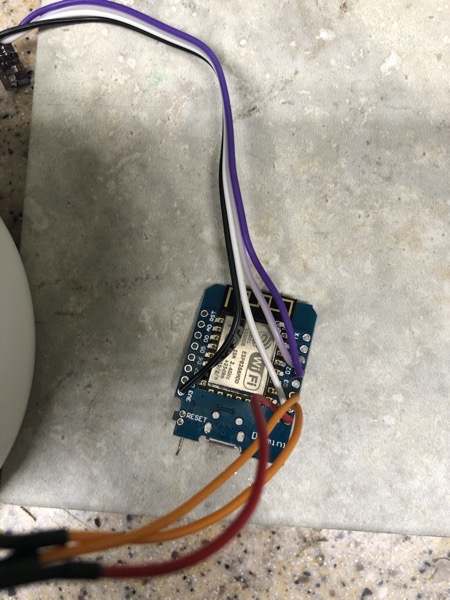
After wiring up the board, I used my trusty Ryobi Hot Glue Gun to glue the pieces into the PVC housing.

I then configured ESPHome. The ESPHome configuration is below:
uart: rx_pin: D4 baud_rate: 9600 -
Combining Ryobi Batteries and Emergency Preparedness
As I've written about before, I really like my Ryobi tools. I have a number of batteries to go with the tools that sit idle most of the time. Ryobi sells a USB charger as well as an inverter that plugs into the batteries. Ryobi's options didn't fit well with my usage as I wanted a way to be able to power 12V electronics such as my HAM radio, HAM radio charger, etc. and using a 120V inverter would be very inefficient. I found a 3D printed case that goes on top of the battery that was pretty close to what I wanted. However, I didn't want a power switch, didn't want USB ports and it didn't terminate in Anderson PowerPole connectors that I use with my HAM radio equipment.
The first step in creating what I wanted was to get the case to look right. As my son is a wizard at Fusion 360, I asked him to make a few modifications to the case to close it up. I then printed the pieces and purchased a step down converter and some Keystone 209 cell leaf spring contacts. I soldered the spring clips to the step down converter, soldered the other end of the converter onto a short piece of 14 gauge wire and then terminated the wire in the PowerPole connectors.
Using some screws I had lying around and hot glue, I assembled all the pieces. Now I have a case that I can easily put on a Ryobi battery that has a 12V PowerPole connector on the top ready to accept any number of devices.
It is a pretty simple project and am not sure when I'll ever need to use it, but I have 2 of them just in case I need some extra emergency power. I have a cigarette lighter adapter to PowerPole that I can plug in and then can put USB chargers in there or I can plug in an inverter or even my HAM radio. I'm not sure of the runtime with a battery, but with the 7 Ryobi batteries I have, I'm sure I can at least charge a few cell phones!
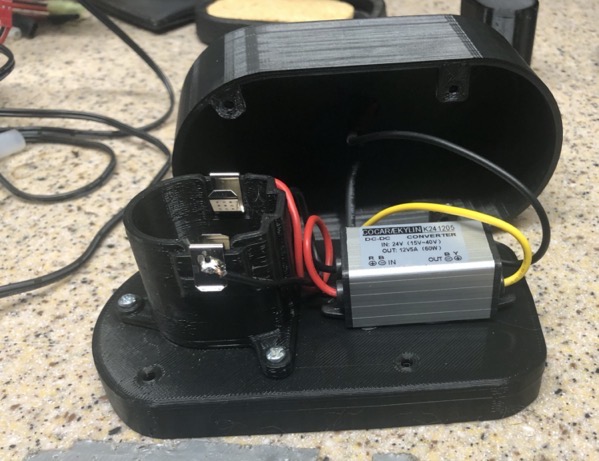
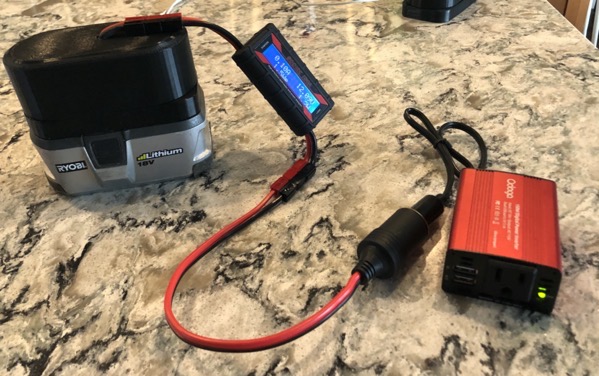
-
How would I evacuate in an emergency?
This year has brought more reasons to prepare for an emergency and has gotten me asking myself if I am ready. When we had the great toilet paper shortage of 2020, I worked with my son on preparing our emergency kit as he was working on his Emergency Preparedness Merit Badge. This was a good start, but was more geared towards what to do when we didn't have access to supplies or food. We didn't think much about evacuations until the fires in Northern California started.
Several years ago, I wrote about preparing for an emergency. This was a start for what we'd need to take if we had to evacuate our house. Looking at the people leaving their homes in Santa Cruz and not being able to return for potentially weeks, having digital copies of things is only part of the solution.
How else can we prepare in case of an evacuation? Thinking about this, I realized that we have camping gear that is readily accessible. This includes tents, sleeping bags, ground clothes, flashlights, camping stove, etc. If we grabbed all this as we were leaving, we'd have a lot of gear needed to survive outside of our house. Clothing is one area that I will say that we're not that organized for an evacuation. We do have duffel bags under the bed, so we'd grab them and shove clothes in them.
While the reasons to evacuate our house in San Diego are small (tsunami is unlikely, wildfire where we live is also not likely; the most likely reason is post earthquake having a limited amount of time to gather stuff), I think that given 15 minutes, we would be in good shape to evacuate. The plan is pretty basic and consists of gathering the following:
- Laptop bag in my office - stuff it with the hard drives and other documents (extra keys and safe deposit key as well) that are kept in the fire safe. The bag already has an extra laptop charger and a way to connect the drives. Also, put my laptop in the bag.
- Portable electronics including hotspot, laptop, iPads and phones.
- Plastic boxes next to the fire safe that has chargers, some camping supplies, flashlights, HAM radio equipment.
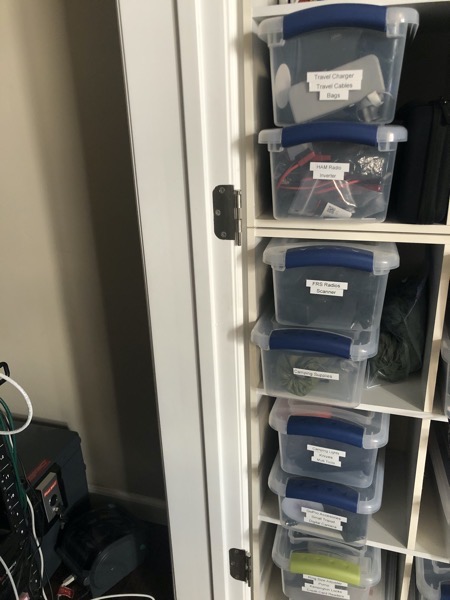
- My wallet and keys.
- Portable HAM radio off my desk.
- Hats and coats that are easy to grab on the way out.
- 3 large plastic containers of emergency supplies that are in the garage.
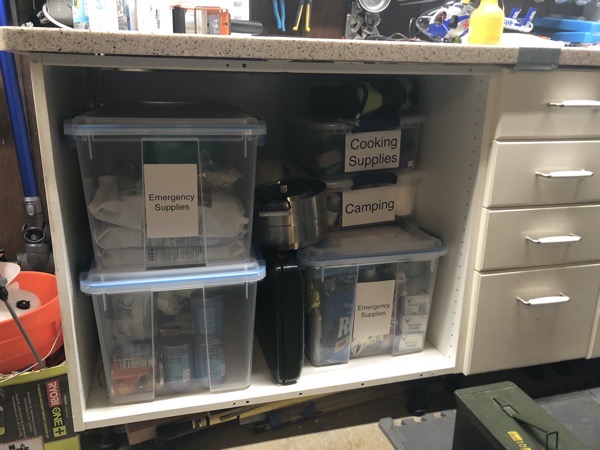
- Tents, sleeping bags, chairs, and tarps used for camping.
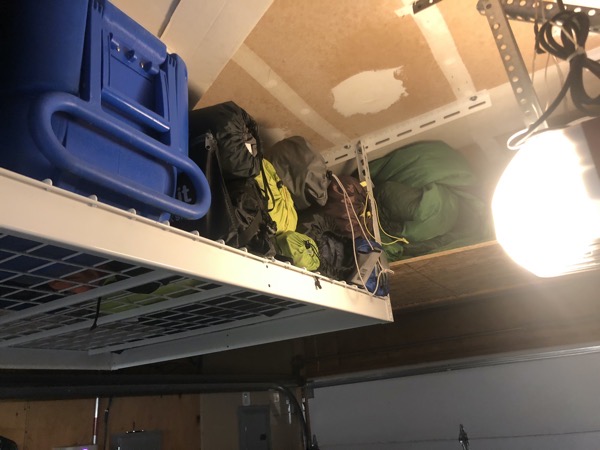
- Gallons of water that are in the garage stored right as we enter the garage. We use these for camping, so they are replenished periodically.
- Some clothes. Put them a duffel bag stored under the bag. Include hiking shoes.
After pulling together everything, I'd load it into the car (along with the mammals) and go.
Our house is relatively small and my office is right next to the garage, so getting items out of my office and loading them into the car is easy. The camping gear is in a rack above my car and the emergency supply boxes are in a cabinet right in front of my car.
I hope that I never have to use my plan, but by thinking about it and rehearsing it in my head makes me rest easier at night.